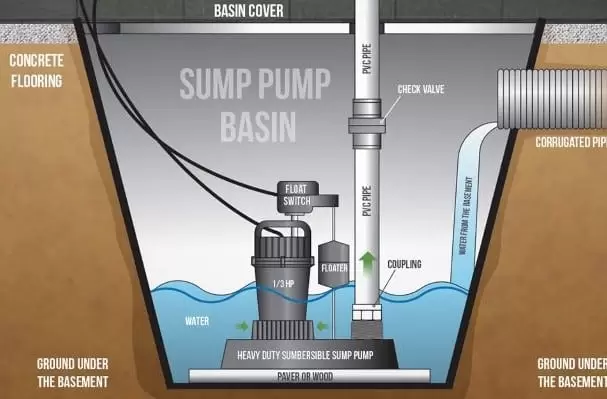Seamless Well Pump Replacement: Restoring Your Water with Precision
Wiki Article
Recognizing the Secret Elements of Effective Water Purification Equipments

Value of Water Filtering Solution
Water filtration systems play a critical function in guaranteeing accessibility to tidy and safe alcohol consumption water by effectively removing pollutants and impurities. These systems are crucial in dealing with the growing problems over water top quality and the prospective health threats associated with eating polluted water. By making use of various purification devices such as reverse osmosis, turned on carbon, and UV sanitation, water purification systems can efficiently remove damaging materials like bacteria, viruses, heavy metals, and chemicals from the water supply.Furthermore, water filtration systems assist to enhance the taste and smell of water by eliminating chlorine, sediments, and various other pollutants that can influence its high quality. Water Softeners. This improvement in water top quality not just makes it extra tasty but additionally motivates people to consume an appropriate amount of water daily, advertising better hydration and general wellness
Kinds of Filtration Components

Physical filters are developed to physically strain out impurities from the water. These filters can be constructed from materials like ceramic, carbon, and even sand, and they work by capturing bits bigger than the filter's pores as water travels through.
Chemical filters make use of numerous chemical procedures to get rid of contaminants from the water. Instances include activated carbon filters, which adsorb pollutants, and reverse osmosis membranes, which make use of pressure to different pollutants from the water.
Organic filters utilize living microorganisms like germs or algae to break down raw material and toxins in the water. These filters are typically made use of in wastewater therapy plants or natural water purification systems.
Understanding the various types of filtration parts is vital for selecting the most ideal water purification system for particular filtration needs.
Function of Sediment Filters
Sediment filters play a vital role in water purification systems by successfully recording solid bits suspended in the water. These filters are generally the first line of defense in a filtering system, removing bigger bits such as sand, silt, dust, and rust before the water relocates with finer purification phases. By capturing these sediments, the filters prevent them from reaching downstream components, therefore expanding the life expectancy and effectiveness of the entire system.The function of debris filters is important in keeping water top quality and protecting delicate equipment from damage triggered by debris. Additionally, by getting rid of noticeable particles, sediment filters boost the clarity and taste of the water. Consistently changing or cleaning debris filters is essential to make sure ideal efficiency. Overlooking this maintenance can bring about clogging, reduced water flow, and jeopardized purification efficiency. In general, debris filters are essential parts that add considerably to the effectiveness of water purification systems.
Duty of Triggered Carbon Filters
Playing a crucial duty in water purification systems, turned on carbon filters are instrumental in eliminating pollutants and contaminants from the water supply. As water passes through the filter, the triggered carbon holds and attracts onto the contaminations, guaranteeing that the water that comes out on the other side is anonymous cleaner and more secure for usage.Turned on carbon filters are very efficient at improving the preference and odor of water by minimizing chemicals that can affect its high quality. They are likewise with the ability of eliminating particular hefty steels like lead and mercury. Additionally, these filters can help stop the build-up of microorganisms and algae in water, further improving its total quality. Due to their convenience and integrity, turned on carbon filters are an essential element in browse around this site making sure that water is cleansed to the highest possible requirements prior to reaching customers.
Understanding Reverse Osmosis Systems
Reverse osmosis systems are innovative water purification systems that use a sophisticated procedure to get rid of contaminants and pollutants from drinking water. These systems work by applying stress to the water, requiring it via a semi-permeable membrane.One trick advantage of reverse osmosis systems is their capacity to eliminate a variety of pollutants, consisting of hefty metals, dissolved bacteria, infections, and solids. This makes them very effective in boosting the total quality and safety and security of drinking water. Additionally, reverse osmosis systems are reasonably low-maintenance and can be installed under the sink or in a central filtration system, supplying practical access to clean water throughout the family. In general, comprehending just how reverse osmosis systems function can assist individuals make notified decisions concerning their water filtration needs.
Final Thought
In final thought, reliable water filtering systems are critical for making certain risk-free and clean drinking water. By recognizing the function and role of each part, people can make enlightened decisions when picking a water filtering system.Water filtering systems play an essential role in ensuring accessibility to safe and clean drinking water by properly eliminating impurities and impurities. By using numerous filtration systems such as reverse osmosis, activated carbon, and UV sanitation, water purification systems can efficiently get rid of harmful materials like microorganisms, infections, heavy metals, and click for info chemicals from the water supply.
Debris filters play an essential role in water filtering systems by efficiently catching solid particles suspended in the water (Water Treatment).Playing an essential role in water purification systems, turned on carbon filters are crucial in getting rid of pollutants and pollutants from the water supply.Reverse osmosis systems are sophisticated water filtration systems that employ an advanced procedure to remove impurities and impurities from drinking water
Report this wiki page